- Home
- Saul Tanpepper
Iceland: An International Thriller (The Flense Book 2) Page 22
Iceland: An International Thriller (The Flense Book 2) Read online
Page 22
"Naïve product — that is, product lacking any biocodes at all — is administered by IV injection into the bloodstream and allowed to distribute evenly throughout the body. It takes roughly twenty hours. About a trillion individual units is optimal. Once implanted, each individual product remains functionally inert until activated."
How is it activated?"
"By the expression of certain ubiquitous cellular stress signals, apoptotic chemicals produced when tissues are damaged or seriously compromised by disease. When that happens, any product in the vicinity transmits to the relay a request for the appropriate biocode panel based on the particular biochemical signature of its environment, or biomarker. The appropriate panel is transmitted by the remote repository, and the product extracts, installs, and executes the program packet. It all happens in less than a second. China was our first large scale study of this type."
"You said you chose only people who were terminal. Those people weren't sick."
"Actually, they were. All of them. After decades of trace mineral extraction by international corporations all over Inner Mongolia, toxins have leeched into the water supplies and poisoned every living creature subsisting on it. Arsenic, chromium, beryllium . . . . Baoyang village was settled on an old vanadium effluent evaporation pond, and through the years, by a process called bioaccumulation, the toxins reached lethal levels. Long before you arrived there, the Baarin people were suffering from every conceivable disease you can imagine."
"Then why was Aston experimenting with regrowing amputations?"
"Ah, well, the Goh Li Xhia study was already nearing completion when Aston took over. The data had been tendered to our review panel. Aston's job was to wrap up operations there. Essentially, he was to ensure that there were no . . . corporate liabilities."
"By which you mean survivors."
"China was an entirely unprecedented situation for us, one we were admittedly not yet prepared to deal with. No previous study had produced survivors. But, yes, that's right. You see, we still had another twelve to eighteen months of testing to do before we would be comfortable going public, so those survivors represented a significant exposure risk to us. No product is more vulnerable to failure than during the period immediately before launch, and we simply couldn't afford to take any chances."
Angel couldn't believe how glib he was in admitting they had intentionally murdered those people after curing them. She tried to speak, to express her outrage, but the words caught in her throat.
"Every study coordinator has one overarching directive, and that is to protect the company so that the product has the best chance of success when it comes time to go public. Aston knew the Baarin test subjects were a security liability; he knew what had to be done. In the end, it was decided that the most humane method to eliminate them all at once would be by crashing the train, ending their lives in an instant."
"Humane?" she said, choking.
"They weren't supposed to live anyway."
"That doesn't give anyone the right to chop someone's hand off multiple times!"
"I agree. We provided Aston with very specific instructions to end the study. But, unbeknownst to us, he was conducting numerous other experiments. They were never sanctioned. That being said, his observations did provide us with invaluable insight into the products' ability to respond to severe trauma."
"You disgust me!" Angel hissed. She wanted to pick up the monitor and hurl it to the ground. But she knew it wouldn't change anything. "You people don't care about human life! You only care about yourselves and the money you dream about making."
"If Aston had survived, the company would never have permitted him to continue on. His violation of trust was unpardonable. Consequently, he would have suffered the same fate as his test subjects. Aston was aware of the risks of his actions. He made a wager hoping selfishly to advance himself. He should have known better. By killing him, you merely executed a plan of action the company would have carried out anyway."
She almost blurted out that she wasn't the one who killed him. Instead, she accused Kurtz of rationalizing their ill-gotten gains.
"And what would you have us do? Should we simply disregard the knowledge we gleaned from his work because of the manner in which it was obtained? Knowledge has no memory of the means by which it is acquired. Truth exists without any moral framework or constraints. Consider what was learned about brain function as a result of early electroshock and surgical experiments. Should we discount its value by some amount equivalent to the torture that was inflicted to obtain it? How would you quantify either of those things?"
"Stop it!" Angel cried, shaking with fury. "Stop making excuses!"
"If it is any consolation, the company regrets any suffering those people may have endured. It has always been our philosophy to treat test subjects with dignity and—"
"Paltry expressions of contrition! You insult me! Humility is not a blanket you drape over yourself whenever the occasion sees fit. Apologizing cannot change the past. It does not absolve you of those sins or excuse you from future consequences."
"We would never try to manage the past, but we do learn from it. We never set out to do further harm to anyone, of that you can be sure."
"Aston was—"
"What occurred in China was . . . unfortunate. But it did directly alter our mission in two very important ways. First, we recommitted ourselves to the benefit of humanity and to the dignity of every individual human being. That includes dedicating ourselves to the survival of all future test subjects. Second, a moratorium was placed on further new experiments until we can be assured that—"
"Liar! There is no moratorium! Your people were in Paris injecting nanites into the refugees just a few days ago! They've been injecting them for months!"
"I repeat, the moratorium is for new experiments."
"I was there! You have been injecting nanites into new refugees as they arrive!"
"As part of an existing study."
"Liar!"
The screen winked out, turning black, and for a moment she thought he had simply given up on her in disgust, convinced that she would never change her mind.
And she wouldn't. Nothing he had shown her convinced her she was wrong. In fact, it only strengthened her convictions that the people behind the technology must be stopped. The risks were simply too great.
She listened to the silence, wondering what was going to happen next. Was someone going to charge into the room and take her away? Would they kill her now or torture her first?
She reached for the gun in the bag draped over her shoulder before remembering she hadn't brought it because of the plane. Nothing to use but a pen she'd taken from the hotel's desk.
She wrapped her fingers around it and braced for the inevitable assault.
Chapter Thirty Three
The taillights were a crimson blur outside Cheong's window. His attention was elsewhere, so he didn't notice when they entered the highway and headed north, and he didn't hear his driver tell him that the relatively short trip to the airport might take them more than an hour because of the extra police checkpoints erected just that afternoon in response to heightened security concerns.
He was thinking about what they had found at the l'Enfantine estate back in Lyon. Not the brother's body, although that had raised other questions while answering only the one he had brought with him. He was annoyed that his intuition had led him so astray in the matter. It was a rare thing to experience, being wrong. He had been so sure that Jacques de l'Enfantine really wasn't dead.
He wondered if maybe it had been wishful thinking on his part, not wanting the woman to be as crazy as some of his people were saying. The message she had left for her dead brother on her home phone less than twenty-four hours before would almost certainly be used to feed the rumor mill.
But there was no way to deny it anymore, neither the death of her brother, nor her questionable mental state. The proof of both was there in the casket, the body with its telltale scar where h
is damaged spleen had been removed. He'd even had Michel cut the withered corpse open, cringing as he had pried apart the stiff leathery skin and brushed away the gray mold. It had been impossible for either of them to confirm the organ's absence among the blackened deformed masses of viscera, but a colleague in Beijing he'd sent photos to had no such doubt. The spleen was gone.
One question answered, yet another one raised: Why had they chosen not to embalm?
Rather, why had Angelique chosen not to, since she was the only surviving member of the family. The parents had already been in the ground for two years when Jacques died, and there didn't seem to exist any document where he had expressed his preferences in the matter.
The young so rarely contemplate the proximity of their own demise, he thought. Whereas the old can think of nothing else.
Still, he couldn't rule out that it had been Jacques' decision, perhaps expressed to the sister orally. It would certainly seem consistent with what he understood of the boy through his interviews with associates of his from his college days in Paris. It was well established, for example, that Jacques had denounced his family ties, distancing himself from the life of privilege he had grown up knowing.
He'd even written and posted numerous articles on the subject on his long-defunct blog, choosing instead to align himself with the poor and downtrodden. Typical spoiled artist behavior. Cries for attention and feeble attempts to convince people he understood what it meant to suffer. The kid had gone bohemian out of some naïve impulse to be accepted by the common man he idolized, only to abandon his self-imposed austerity the moment his parents died, return to his childhood home and all its comforts, and resume his former privileged life.
Or it could be that eschewing the embalming process was simply an old family custom. Cheong had no way of knowing, not without disinterring the parents' bodies. If the woman hadn't returned to the house when she had, he might have had Michel dig them up, too. Instead, he'd sent the man to follow her after she left.
But the damn question continued to niggle at his mind, distracting him to no end.
He sighed, ghosting the window with his breath. He didn't notice it, nor did he notice the driver asking him if he was feeling all right.
He supposed it could have been Angelique's decision not to embalm.
He was aware of the time she'd spent in Tibet. He knew about the weeks she'd stayed with the monks in their high monasteries. Some sort of religious pilgrimage thing in the guise of a medical investigation. Details of her visit were scant, other than the article she'd published looking into an outbreak of pneumonic plague. It hadn't escaped Cheong how that chapter in her life, coming on the heels of her brother's death, paralleled Jacques' own frugal period preceding their parents'. They had both sought similar ways to distance themselves from their family's legacy, even if only temporarily.
He knew, for example, that among the ideas she had learned from the monks was the Buddhist practice of leaving the dead on a mountaintop, exposed to the elements and available for the scavengers to pick at. It was meant to hasten the return of the flesh back to the natural world from which it had come. Such rituals would not be possible in France, of course, but one could refuse the preserving chemicals used in embalming, thus allowing the deceased to return naturally to the earth.
Unfortunately, the timing didn't really fit. Her trip came after Jacques' death, so such a mindset would have had to be in place already. He supposed it was possible she'd gone to Tibet seeking validation rather than education.
He scowled unseeingly at the window, hating that there was still so much about the woman he knew absolutely nothing about. It made him terribly uncomfortable. Especially since she had never overtly avoided his questions during the times he had interacted with or observed her. By failing to ask her the right questions when he had the chance, he'd missed his opportunity to settle the issue once and for all.
What really irritated him was that he had assumed she was like so many of the normal people he had met and dealt with over the years, people who led simple lives and whose existences could be fully comprehended by the slightest scraping away of the thin covering they accumulated around themselves.
Especially now.
He clenched his fists until his knuckles cracked. Yes, especially now, after what they had found in the house.
He still couldn't believe that his team had missed it on their previous inspection, months before. It was only because of Angelique's untimely return that the secret door in the back of the closet in the master bedroom had been discovered this time, hidden away behind stacks of empty boxes. His man had found the latch while concealing himself.
The small hatch led to a passageway beneath the house.
Cheong had ordered the man not to enter it. He didn't want to trigger any alarms while she was there. And so they waited until she departed later in another car for hire with Michel following behind her.
A half hour after their departure, Michel called to inform Cheong that the woman was at the airport buying a ticket somewhere.
"Stay with her," he told the man.
Only after she boarded and the plane taxied for lift off did Cheong feel comfortable enough to enter the tunnel and inspect, which he was forced to do himself, as the other two men were occupied with keeping watch.
The torn cobwebs and tracks in the dust on the floor made it clear the passageway had been used recently. And although the lights strung along the ceiling didn't seem to work at first, he soon discovered that the ancient bulbs had simply been unscrewed from their sockets, perhaps to avoid inadvertently drawing anyone's attention at night. The woman had taken great pains to conceal any outward indication of the passageway, both from within the house and at its opposite terminus inside the burned out structure to the rear of the property. But why?
He could accept the fact of the tunnel's existence, imagining that either the original builder or one of the subsequent owners had installed it to enable them to travel easily between buildings, whether as protection from the elements or from prying eyes. It wasn't unreasonable to assume it had been used in the past by someone meeting a secret lover, for example. The scorched box springs in the outbuilding proved that a bed had once been located there.
But why would Angelique need to use it at all? Why, when no one else was around but the occasional maid or delivery person to hide from, would she even bother with it?
Those were the questions that plagued him as he stood inside Chèvrefeuille, staring at the hidden door in the closet. One question answered and so many more raised.
He personally searched the house again, taking his time. But he found no more surprises.
His phone had rung just as he was finishing and was about to call Emily to let her know they were heading back to the airport. It was Michel reporting back that the woman had checked into a hotel in Istanbul. He'd gotten from the desk clerk that she asked about going to the fish market. "Continue to follow her," Cheong had instructed.
But that was hours ago now, and Michel was overdue to report back.
So many questions. So much left unexplained.
The car rolled to a stop at a checkpoint. They watched and waited as soldiers shone lights into each vehicle, spending more time on some than others. When it was their turn, Cheong's driver asked what was going on. The soldier standing at his window didn't answer. He only asked if they had any weapons.
"I have a permit," the driver told him, carefully opening his jacket to show him the small pistol in its shoulder holster. "It's in my wallet in my back pocket."
The soldier had them pull over to the side, then step out of the vehicle, where they were asked to surrender their passports to run through INTERPOL and the ECRIS database.
They could do nothing but watch as the trunk was popped open.
"What are the shovels for?"
"Planting trees."
They asked Cheong to open his briefcase. The soldier flipped quickly through the contents, giving the padded manila envelope cont
aining the tissue sample he had collected from the grave a cursory glance. He didn't open it.
They lifted the floor mats, checked under the hood. They used mirrors to look for bombs underneath. A dog was brought in and walked through the inside of the car.
After all that, they still had to wait for the ECRIS results to come back.
Hours passed, and there was little they could do. Eventually, they were cleared to go. It was long past midnight by then, too late to fly out. The soldiers apologized, finally explaining that the security warnings had been well warranted, as several terrorist attacks had occurred simultaneously in the Middle East that evening. There were threats of more bombings worldwide, but none as yet in Europe.
"Even so," the soldier told them, "most commuter air travel has been suspended."
Chapter Thirty Four
A flickering glow brought Angel's attention back to the monitor. The view of the other room had returned to the screen. The chair was empty.
She waited, nerves frazzled, and wondered what had been done with Norstrom. Shadows shifted against the wall in the background, hints of movement. She could hear a faint murmur of voices. Then Kurtz was back:
"Despite what you may think of our methods, Madame, the tragedy you witnessed yesterday at Herr Nordqvist's retreat was not our doing and certainly not the outcome we had hoped for. We would never wish for such violence; it goes against the company's core beliefs."
"Your actions say otherwise," she said, slowly relaxing her grip on the pen and withdrawing her hand from the bag. "What of the people you killed yesterday, the woman and men? There was even a boy!"
Kurtz sighed heavily, as if this conversation was a terrible inconvenience for him. "Justifiable sacrifices under the circumstances. I needed to impress the gravity of the situation upon Herr Nordqvist. What he was intending to do with our product was totally unacceptable. It would have caused many more deaths in the long run."

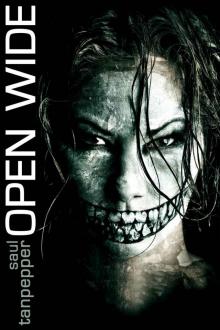 Open Wide
Open Wide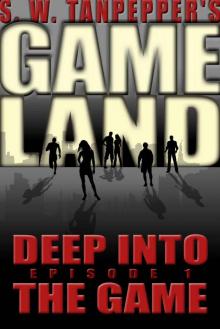 Deep Into the Game: S.W. Tanpepper's GAMELAND (Episode 1) (Volume 1) (S. W. Tanpepper's GAMELAND)
Deep Into the Game: S.W. Tanpepper's GAMELAND (Episode 1) (Volume 1) (S. W. Tanpepper's GAMELAND)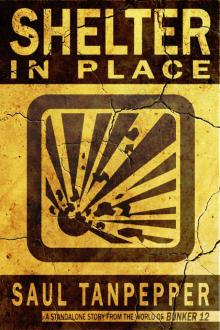 Shelter in Place: A short story from the world of BUNKER 12
Shelter in Place: A short story from the world of BUNKER 12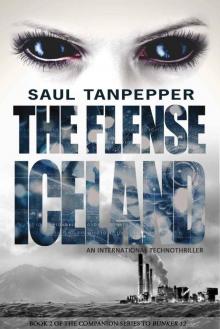 Iceland: An International Thriller (The Flense Book 2)
Iceland: An International Thriller (The Flense Book 2)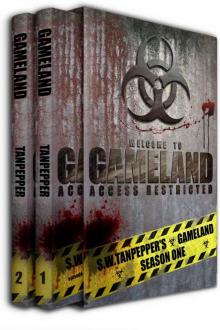 GAMELAND Episodes 1-2: Deep Into the Game + Failsafe (S. W. Tanpepper's GAMELAND)
GAMELAND Episodes 1-2: Deep Into the Game + Failsafe (S. W. Tanpepper's GAMELAND)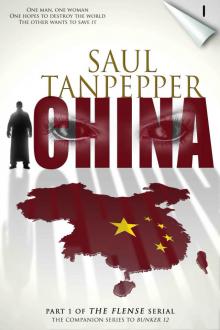 THE FLENSE: China: (Part 1 of THE FLENSE serial)
THE FLENSE: China: (Part 1 of THE FLENSE serial)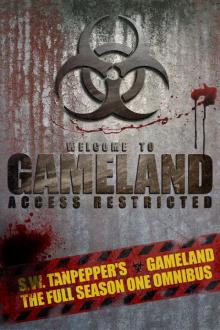 S.W. Tanpepper's GAMELAND, Season One Omnibus
S.W. Tanpepper's GAMELAND, Season One Omnibus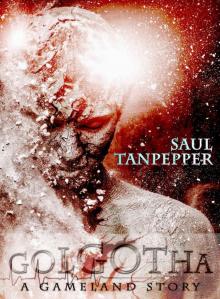 Golgotha: Prequel to S.W. Tanpepper's GAMELAND series (S. W. Tanpepper's GAMELAND companion title Book 1)
Golgotha: Prequel to S.W. Tanpepper's GAMELAND series (S. W. Tanpepper's GAMELAND companion title Book 1)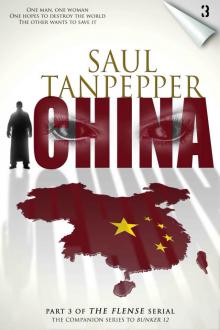 THE FLENSE: China: (Part 3 of THE FLENSE serial)
THE FLENSE: China: (Part 3 of THE FLENSE serial)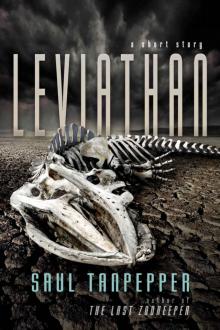 Leviathan: A Short Story About the End of the World
Leviathan: A Short Story About the End of the World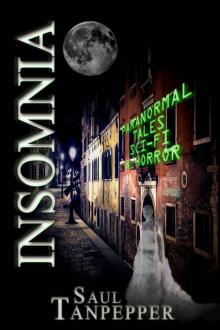 Insomnia: Paranormal Tales, Science Fiction, & Horror
Insomnia: Paranormal Tales, Science Fiction, & Horror Velveteen
Velveteen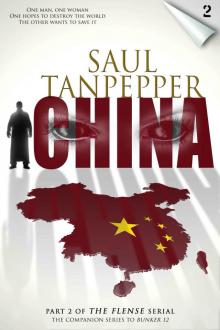 THE FLENSE: China: (Part 2 of THE FLENSE serial)
THE FLENSE: China: (Part 2 of THE FLENSE serial)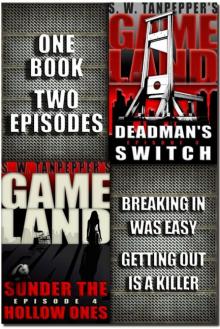 Deadman's Switch & Sunder the Hollow Ones
Deadman's Switch & Sunder the Hollow Ones